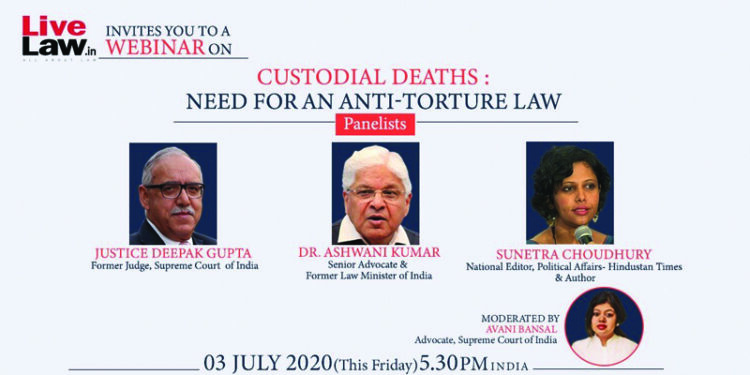NE LEGAL BUREAU
NEW DELHI, JULY 4
India needed proper implementation of existing laws to curb custodial torture before enacting another in consonance with international covenants, said former Supreme Court Judge, Justice Deepak Gupta here on Friday.
Justice Gupta, who was speaking in a webinar on the topic of ‘Custodial Deaths: Need For An-Anti-Torture Law’, said ”there can be no doubt that we require an anti-torture law. But, it must be done by Parliament.’ ‘The court only decides what is legal and not legal,” he added. The Webinair was organised by the LiveLaw.in
The former judge said the investigations and the prosecutions are not fair, which must be rectified first and spoke about the recent incident of death of father and son due to torture in police custody in Tamil Nadu.
He said ‘there were rules that were violated’. “Even during COVID times, we see cases of police brutality and the police being helpful. But, the former is more and it’s against the poor. In the Tamil Nadu case, they had kept the shop open for 15 extra minutes? Was it that serious an offence? “Police does not attack the privileged. Let’s first implement the law as we have it. The investigations, the prosecutions are not fair; these must be rectified first,” Justice Gupta said and added that the change in mindset is also required before bringing in an anti-torture law.
“If the police are trained in a better manner, then even our existing police can do better,” he said at the webinar in which former union law minister and Congress leader Ashwani Kumar, also participated and stressed that the human dignity, which is the core value, cannot co-exist with torture.
Kumar said that India is yet to enact a law which is a prerequisite for us to become a responsible member of the international legal regime against torture. “If human dignity is the core value, how can torture co-exist… The happenings in Tamil Nadu have once again shocked the conscience of the nation. How can we not have a law on anti-torture,” he asked.
Kumar had filed a PIL before the Supreme Court seeking a direction to the Centre to frame a law on custodial torture and inhuman treatment as India was a signatory to the United Nations’ convention on torture.
The apex court later disposed of the PIL after the Attorney General submitted that the plea against torture was discussed by the Law Commission and its has made certain recommendations and the same were being ‘seriously considered’ by the central government. Journalist Sunetra Choudhury said that the cases of police torture were always there but for a long time, people thought that those who were in custody deserved to be there.
“It’s problem of mindset which has been perpetuated by the society, by the government, by our policy-makers. Until and unless this is tackled, there’s no point in bringing an anti-torture law,” she said.












